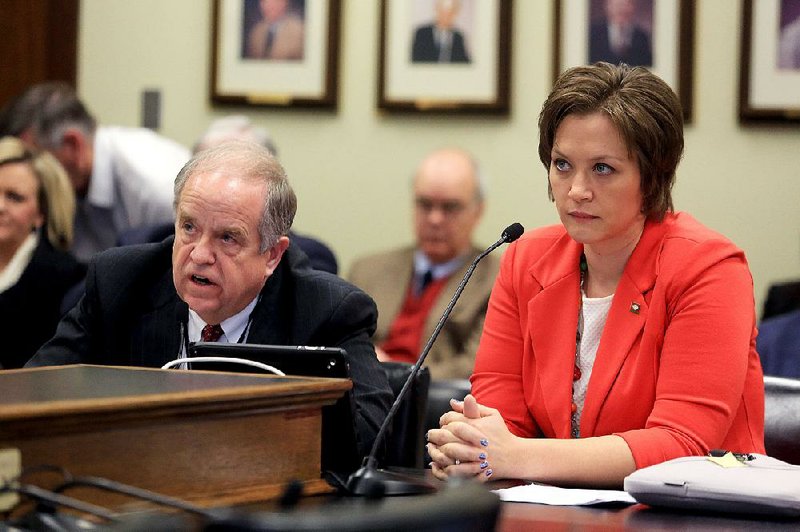The Arkansas House voted for legislation Friday to stop using a Common Core-aligned assessment test in the state's schools, beginning next year.
The House passed more than a dozen bills Friday including House Bill 1241 to end the state's use of the Partnership for Assessment of Readiness for College and Careers, or PARCC exam, after June 30. The House also reconsidered and passed a second measure asking for a constitutional convention and approved a measure that would lead to increased training for real estate agents.
The Senate didn't meet Friday.
The House, in an 86-1 vote, passed HB1241 after a short debate and sent it to the Senate.
"Most of the feedback that you're hearing now about the problem with the PARCC test is coming from rank-and-file educators -- teachers, guidance counselors, you're now starting to hear from administrators," said the bill's sponsor, Rep. Mark Lowery, R-Maumelle. "I'm not standing up here today to make any kind of pronouncements about Common Core. ... The truth is there are some excellent assessment alternatives that can be looked at."
The PARCC exams, which are to be used for the first time this year in an online format by Arkansas' school districts, were tested in paper form last year.
The exams are based on a common set of math and literacy standards that have been adopted by most states since 2010, called Common Core. A consortium of about a dozen states, including Arkansas, is developing and administering exams based on that curriculum.
Beginning next week and going through early May, more than 5 million students nationwide in grades three through 11 are expected to take the PARCC performance-based and end-of-year tests. Well over half of those students -- including a majority of Arkansas test-takers -- will use desktop and laptop computers.
HB1241 was amended last month to eliminate a requirement that the state return temporarily to using the Arkansas Benchmark Exams, which some opponents said would have endangered a waiver application by the Arkansas Department of Education to delay a portion of the federal No Child Left Behind law that ties teacher and principal evaluations to test scores. The previous Benchmark Exams no longer align with Arkansas standards, they said.
Revisions to the bill also scrapped a requested task force to choose a different assessment test or create one for the state. Gov. Asa Hutchinson announced last month that he planned to form a task force to study Common Core in general. Almost 760 people submitted applications to be on the task force and review the standards.
Lowery added another caveat to the bill, prohibiting the state from sharing a student's data with the federal government without written consent of that student's parents.
CONSTITUTIONAL CONVENTION
The House also voted to reconsider House Joint Resolution 1003, which failed Tuesday. The resolution, by Rep. Bob Ballinger, R-Hindsville, passed Friday in a 52-33 vote.
The resolution calls for the state to apply for a constitutional convention under Article 5 of the U.S. Constitution to address concerns about federal overreach including unfunded federal mandates, to place fiscal restrictions on the federal government and to impose term limits on members of Congress and other federal officials.
The measure went through a convoluted legislative process Friday before being sent to the Senate, including a rarely used measure to expunge the votes of members who were not sitting in their seats at the time of the vote count.
The House passed a bill Thursday to approve participation in a balanced-budget compact to call for a constitutional convention. HB1006 by Rep. Nate Bell, R-Mena, specifically calls for an amendment requiring a balanced budget and would place other financial checks on the federal government.
So far, at least three states have adopted similar resolutions.
REAL ESTATE TRAINING
The House also voted 77- 7 to pass HB1504 by Rep. Laurie Rushing, R-Hot Springs, and send it to the Senate. The measure would give the Real Estate Commission the power to increase the number of hours of continuing education -- including safety classes -- required of real estate agents to renew their licenses.
The change comes after Realtor Beverly Carter of Scott was kidnapped and killed in September after arranging to meet a potential buyer to show a house. Arron Michael Lewis, 34, and his wife, Crystal Hope Lowery, 42, have been arrested and charged with capital murder and kidnapping.
The legislation allows the commission to increase the current requirement of six hours of continuing education to up to nine hours of classes. The bill does not specify what training is specifically required, but several legislators remarked that in light of Carter's death, they hoped some of the increased training requirement would include safety precautions.
INSURANCE EXCHANGE
Also Friday, the House Insurance and Commerce Committee approved Senate Bill 343 by Sen. Jim Hendren, R-Sulphur Springs, which would prohibit a state-based health insurance exchange from being implemented until the U.S. Supreme Court rules in the King v. Burwell case. The plaintiffs in the case are challenging the legality of health insurance subsidies granted in states that use federally run exchanges.
Arkansas has a federally run exchange in a partnership between the state and federal government.
If the U.S. Supreme Court allows health insurance subsidies under the federal Patient Protection and Affordable Care Act for a state-based insurance exchange, but not for an exchange operated by the federal government, then "implementation of an appropriate health insurance exchange for the state of Arkansas shall be determined by a future act of the General Assembly" under SB343.
But if the U.S. Supreme Court allows subsidies for both state-run and federally run exchanges, then the authority of the Arkansas Health Insurance Marketplace to implement a state-run exchange "shall not be affected" by SB343.
The measure will move to the House floor next week.
Metro on 03/07/2015


